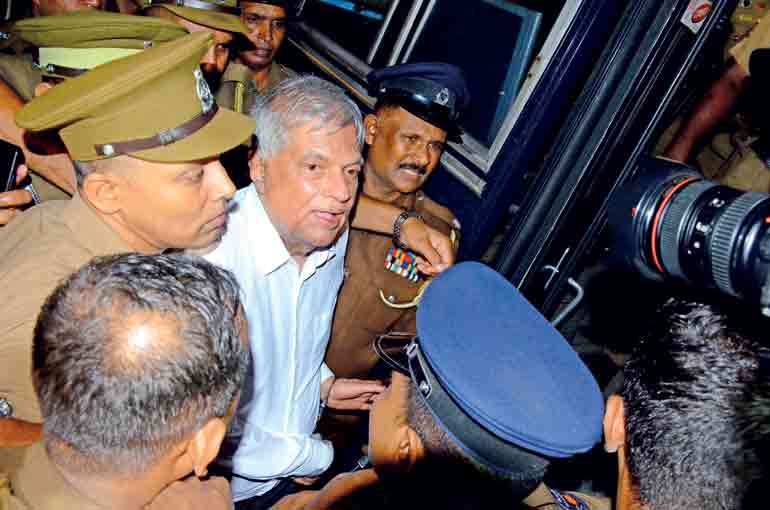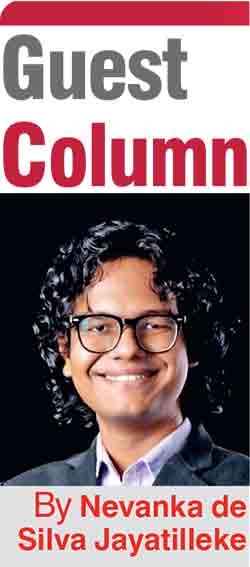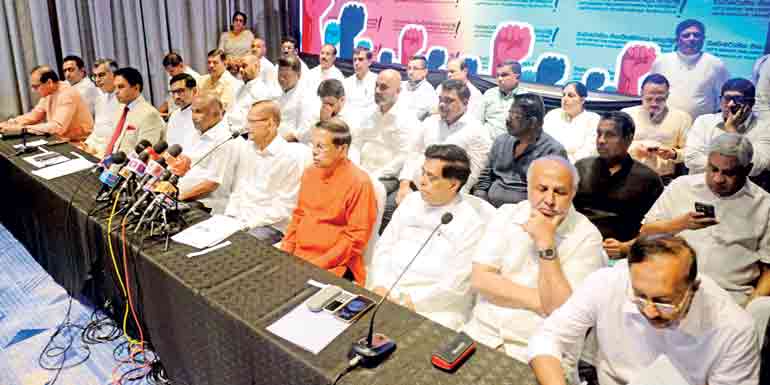Monday Feb 23, 2026
Monday Feb 23, 2026
Tuesday, 26 August 2025 00:39 - - {{hitsCtrl.values.hits}}

The arrest of former President Ranil Wickremesinghe is arguably one of the most seismic disruptions to Sri Lankan politics in recent history. It has placed the Government, the opposition, and the broader political system under the spotlight, testing the credibility of the NPP administration’s anti-corruption drive while simultaneously challenging norms that have enjoyed a high threshold of tolerance within our society. The heated public debate generated by the incident reflects the sharp divides amongst Sri Lankans about whether this moment represents a turning point toward accountability or a slide to a more dangerous brand of political victimisation.
At the heart of the matter is a fundamental question: can Sri Lanka strike the delicate balance between pursuing justice against corruption and safeguarding the principles of democratic governance?
 The Government’s position
The Government’s position
The Government has sought to present the arrest as part of a broader, honest effort to confront corruption and break with the culture of impunity that has long defined Sri Lankan politics. Its message is clear: no individual, regardless of position or past service, should be above the rule of law. This narrative resonates with a public weary of systemic graft, particularly after years of economic crisis and decades of erosion of institutional trust – the “76-year long curse” as the NPP successfully framed in the lead up to the polls last year.
Yet the Government still faces a serious challenge in managing perceptions. While some applaud the arrest as a sign that the administration is willing to pursue justice at the highest levels, others view it as politically motivated. For the Government, communication is critical. It must not only show that evidence exists, but also demonstrate transparency in the judicial process, making information available without prejudicing legal proceedings. Failure to do so risks feeding accusations that the anti-corruption drive is being selectively weaponised.
Public reactions
Among the public, responses to Wickremesinghe’s arrest vary widely. Some argue he should not have been targeted given his role in stabilising the country during the height of the 2022 economic crisis, while others feel the move is long overdue. Still others argue that while Wickremesinghe may indeed have to face accountability, there are other figures who are more emblematic of corruption who should have been pursued first. The split in opinion reveals not only deep partisan divides but also broader disillusionment with the political establishment.
Ultimately, the Wickremesinghe arrest sits at the intersection of two powerful but often conflicting imperatives: the need to combat corruption and the need to preserve democratic freedoms. The Government must carefully navigate this terrain, ensuring that the fight against corruption does not become a pretext for silencing political opponents. For the Opposition, the challenge is equally steep. The SJB must articulate a credible stance that defends democratic values without appearing to protect discredited political elites. Other opposition voices, such as those in the United Opposition, may continue to press the victimisation narrative, but they risk alienating an electorate hungry for change
At the same time, for a segment of the population, the symbolism of arresting a former president underscores that the Government is serious about accountability. This view sees the arrest as a signal that Sri Lanka is attempting to construct a new political culture in which no one is exempt from scrutiny.
It is obvious that the arrest of a former president would not go unnoticed internationally. These are also signals to the Sri Lankan Government, that the matter is not one that can be limited to managing domestic perspectives alone. Indian parliamentarian Shashi Tharoor expressed concern that Sri Lanka may be setting a precedent that could weaken democratic institutions if such arrests are seen as politically driven. At the same time, former Norwegian peace envoy Erik Solheim called for Wickremasinghe’s urgent release, describing him as the leader who “stood up to save Sri Lanka when the nation reached rock bottom.”.
The Opposition’s dilemma
The main opposition, the Samagi Jana Balawegaya (SJB), has been placed in a difficult position. On the one hand, they have criticised the arrest as potentially undermining electoral democracy, suggesting that the Government may be using judicial tools for political purposes. On the other hand, they are acutely aware of the risks of being perceived as defending the “old guard” that many voters associate with corruption and failed governance. The identity of “old guard” is political anathema today – as indicated in the last general election. The NPP’s resounding victory, and the blatant rejection of more well-known candidates at that election, highlights how visceral voter reactions are towards those who are representative of a corrupt political system.
If we abide by this perspective, the actions of SJB leader Sajith Premadasa appear to be based on the calculation of a careful balance. He avoided joining the “United Opposition” press conference convened by G. L. Peiris, instead opting to visit Wickremesinghe in hospital. The optics suggest that the SJB wants to show solidarity with a former head of state (and Premadasa, with his former party leader) while maintaining distance from being lumped together with figures widely regarded as part of Sri Lanka’s entrenched political establishment.
For the SJB, this is a strategic gamble. They appear to be adopting a nuanced stance: framing the arrest as a risk to democratic norms, while avoiding overt defense of Wickremesinghe himself. This allows them to highlight concerns about potential authoritarian drift, without jeopardising their strategic imperative of being the core opposition or alternative to the Government. Naturally, this savviness can also be problematic. They may lose the opportunity presented to them for fear of being unbalanced, and appear indecisive or irrelevant in the eyes of the public.
The role of the “United Opposition”
Can the “United Opposition” succeed in its vision? Or is it instead a further step of miscalculation by a critical mass of rejected politicians? Former Minister Professor G. L. Peiris efforts to galvanise a broader anti-Government front frame the arrest as a clear case of political victimisation. The United Opposition’s narrative is that this is not about justice, but about settling scores and taking political revenge, particularly against the man who cracked down on the Aragalaya soon after assuming the presidency.
The principal strength, and weakness, of Peiris’ coalition is that includes a gallery of familiar figures from Sri Lanka’s older political class. While it brings together multiple opposition voices, it also risks reinforcing the public perception that this bloc represents precisely the culture the Government is claiming to dismantle.
Adding complexity to the debate are interventions by former Presidents Chandrika Bandaranaike Kumaratunga and Maithripala Sirisena. Chandrika has criticised the arrest as politically short-sighted, warning that it could destabilise democratic institutions and erode the Government’s credibility abroad. Sirisena, by contrast, has adopted a more cautious line, emphasising the need to let the judiciary handle the matter while expressing concern about selective application of justice.
It is noteworthy that Sirisena’s support to Wickremasinghe was done in a very public way despite their historical animosity, going so far as to visit and sit next to him at the Magistrate’s Court. In effect, these voices highlight the continuing role of elder statespersons in shaping political discourse, even if their influence over public opinion has waned, while also being deeply symbolic of a culture of camaraderie amongst the political class. Sirisena’s action appears to thus be unity not in principle, but as a reflex to defend entrenched privilege.

The bigger picture
Ultimately, the Wickremesinghe arrest sits at the intersection of two powerful but often conflicting imperatives: the need to combat corruption and the need to preserve democratic freedoms. The Government must carefully navigate this terrain, ensuring that the fight against corruption does not become a pretext for silencing political opponents.
For the Opposition, the challenge is equally steep. The SJB must articulate a credible stance that defends democratic values without appearing to protect discredited political elites. Other opposition voices, such as those in the United Opposition, may continue to press the victimisation narrative, but they risk alienating an electorate hungry for change.
The Wickremesinghe arrest could either mark a step toward genuine accountability or risk deepening political divisions. Much depends on how both Government and Opposition handle the moment, and whether they can steer the country toward a future defined not by old political rivalries but by stronger institutions, transparency, and renewed public trust
Looking ahead
The next few months will be crucial. If the Government can convincingly demonstrate that the arrest is grounded in solid evidence, handled transparently, and pursued within the framework of the law, it may strengthen its claim to be spearheading a new political culture. If it fails to communicate effectively or appears selective in its actions – ignoring potentially corrupt officials within its own ranks – it could face a serious backlash, both domestically and internationally.
For the SJB, the path forward involves continuing to craft a distinct identity, one that neither aligns with the old guard nor allows the Government to monopolise the anti-corruption narrative. Premadasa’s calculated moves suggest an awareness that electoral success depends on striking this balance.
Sri Lanka is therefore at a crossroads. The Wickremesinghe arrest could either mark a step toward genuine accountability or risk deepening political divisions. Much depends on how both Government and Opposition handle the moment, and whether they can steer the country toward a future defined not by old political rivalries but by stronger institutions, transparency, and renewed public trust.
(The author is a political analyst, and lecturer in international relations, political economy and democracy and democratisation)